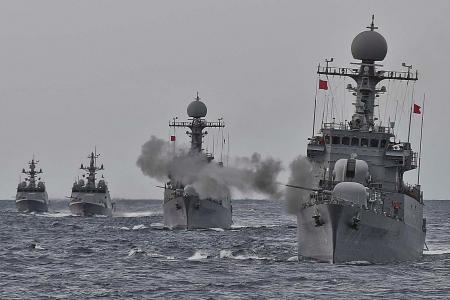North Korea reportedly moving intercontinental missile to coast
South Korea, US in pact to meet new threats
SEOUL: South Korea yesterday said an agreement with the United States to scrap a weight limit on its warheads would help it respond to the threat posed by North Korea, which conducted its sixth and largest nuclear test on Sunday.
South Korean officials believe more weapons tests by the reclusive state are possible, despite international outrage over the nuclear test and calls for more sanctions against it.
South Korea's Asia Business Daily, citing an unidentified source, reported that North Korea had been observed moving a rocket that appeared to be an intercontinental ballistic missile (ICBM) towards its west coast.
The rocket started moving on Monday and was spotted moving only at night to avoid surveillance, the newspaper said.
South Korea's Defence Ministry, which had warned on Monday that North Korea was ready to launch an ICBM, was not able to confirm the report.
Analysts and South Korean policymakers believe North Korea may test another weapon on or around Sept 9, when it celebrates its founding day.
Its fifth nuclear test fell on that date last year, reflecting its tendency to conduct weapons tests on significant dates.
US President Donald Trump and his South Korean counterpart Moon Jae In agreed on Monday to scrap a warhead weight limit on South Korea's missiles, South Korea's presidential office said.
The White House said Mr Trump gave "in-principle approval" to the move.
The US and South Korea had signed a pact in 1979, a year after the South successfully tested a ballistic missile, with Washington expressing the need for limits on ballistic missile capability over concern that tests could undermine regional security.
The two are technically still at war with North Korea after the 1950-53 Korean conflict ended with a truce, not a peace treaty.
ALTERED BALANCE
Both sides have thousands of rockets and artillery pieces aimed at each other, and the North's rapid development of nuclear weapons and missiles has altered the balance.
South Korean Defence Ministry spokesman Moon Sang Gyun told a briefing: "We believe the unlimited warhead payload will be useful in responding to North Korea's nuclear threats."
Under current guidelines, South Korea can develop missiles up to a range of 800km with a maximum payload of 500kg.
Most of North Korea's missiles are designed to carry payloads of 100kg to 1,000kg, said Nuclear Threat Initiative, a US-based think tank.
South Korea's navy held more exercises yesterday, an officer told a Defence Ministry briefing.
"Today's training is being held to prepare for maritime North Korean provocations, inspect our navy's readiness and to reaffirm our will to punish the enemy," the official said.
Russian President Vladimir Putin said threats of military action were counterproductive.
"Russia condemns North Korea's exercises, we consider them a provocation," he told reporters after an international summit in China. "(But) ramping up military hysteria will lead to nothing good. It could lead to a global catastrophe." - REUTERS
Get The New Paper on your phone with the free TNP app. Download from the Apple App Store or Google Play Store now



